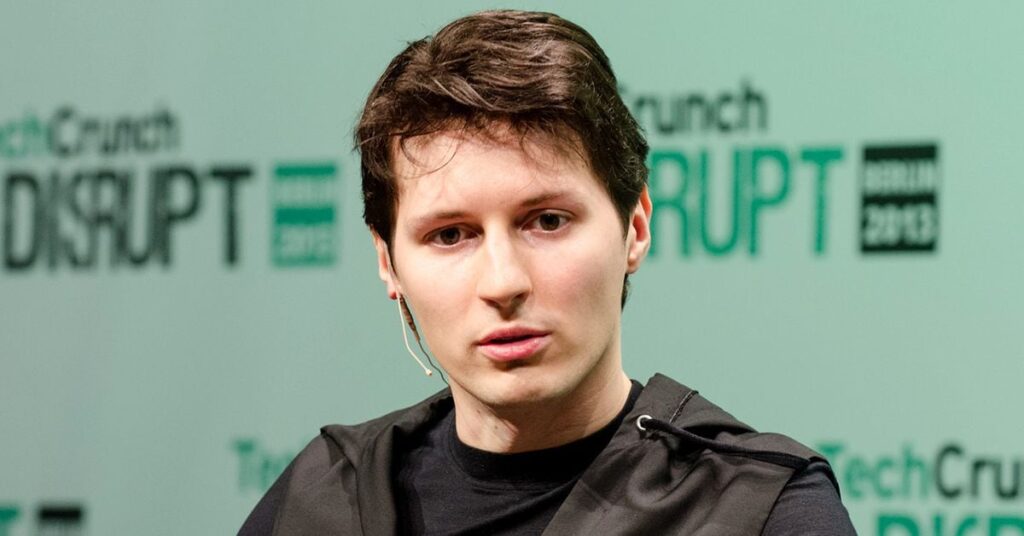In this Article we will discuss about Founder of Telegram Pavel Durov Detained at a French Airport

Founder of Telegram Pavel Durov Detained at a French Airport: This is What We Currently Know
Table of Contents
ToggleIntroduction
Pavel Durov, the enigmatic tech billionaire behind Telegram, has been thrust into the spotlight once again, but this time, it’s not for his innovative strides in digital privacy. Over the weekend, Durov was reportedly detained at Le Bourget airport in France, sparking a wave of reactions from across the globe. The arrest has raised significant concerns, especially given Durov’s role in shaping one of the world’s most influential messaging platforms.

Who is Pavel Durov?
Pavel Durov is not just another tech entrepreneur; he’s a symbol of digital resistance and innovation. Born in Russia, Durov first made waves as the founder of VKontakte (VK), Russia’s largest social network. However, his refusal to comply with Russian government demands to shut down opposition groups led to his ousting from VK. This pivotal moment in his career paved the way for the creation of Telegram in 2013, a messaging app that has become synonymous with encrypted communication and privacy.
Durov’s vision for a secure communication platform resonated with millions, and today, Telegram boasts nearly a billion users worldwide. His wealth, estimated at $15.5 billion, and his influence have made him a key figure in the tech world, but they have also placed him in the crosshairs of various governments.
Details of the Detention
According to reports, Durov was detained shortly after his private jet landed at Le Bourget airport, just outside of Paris. The arrest, which took place late on Saturday, was confirmed by three sources close to the matter, though no official statement has been released by French authorities. The reasons behind the detention remain murky, but sources suggest that it might be linked to an outstanding arrest warrant in France, possibly related to Telegram’s operations and the alleged misuse of the platform by criminal elements.
French Authorities’ Actions
The arrest was reportedly orchestrated by French police units specializing in anti-fraud and cybersecurity, hinting at the seriousness of the allegations. It is speculated that Durov is being investigated for potentially allowing crimes to occur due to a lack of sufficient moderation on Telegram. This raises significant questions about the extent to which platform owners can be held accountable for the actions of their users—a complex issue that straddles legal and ethical boundaries.
Telegram’s Response
In the wake of Durov’s detention, Telegram issued a statement defending its practices and policies. The company emphasized that it adheres to European legal standards, including the Digital Services Act, and continuously improves its moderation efforts. Telegram also underscored that Durov, who holds dual citizenship in France and the UAE, has nothing to hide and regularly travels across Europe. The platform’s statement reflects its ongoing commitment to privacy and free expression, even in the face of mounting pressures.
Reactions from the Tech Community
The tech community has not remained silent on this matter. Elon Musk, the owner of X (formerly Twitter), was quick to voice his concerns, suggesting that Durov’s detention represents a broader attack on free speech in Europe. Musk’s comments highlight the growing unease among tech leaders about the increasing scrutiny and legal challenges they face, particularly in Europe, where privacy laws and digital regulations are becoming more stringent.
Russian Government’s Response
The Russian government’s reaction to Durov’s detention has been swift and vocal. Maria Butina, a Russian legislator and former unregistered agent in the U.S., labeled Durov as a “political prisoner” and accused the West of engaging in a witch-hunt. Dmitry Medvedev, former Russian President, and a frequent critic of the West on Telegram, also weighed in, suggesting that Durov made a grave mistake by leaving Russia and attempting to live as a global citizen. Moscow’s intervention, despite Durov’s French citizenship, underscores the ongoing tug-of-war between Durov and his homeland, where he has been both a target and a hero.
Impact on Telegram
Telegram’s future could be significantly impacted by this incident. The platform has already been under intense scrutiny, particularly due to its role in the Russia-Ukraine conflict, where it has been a vital source of uncensored information. Telegram’s reputation as a bastion of free speech and privacy is at stake, and this latest development could either bolster its standing as a resilient platform or lead to increased pressures and restrictions.
The Legacy of VK and the Birth of Telegram
Durov’s journey from founding VK to creating Telegram is a tale of resistance against government control. After leaving Russia under duress, Durov sought to build a platform that would be immune to governmental pressures. Telegram, with its focus on encryption and user privacy, was the answer. However, this commitment to privacy has often put the platform at odds with authorities worldwide, leading to various challenges, including the current situation in France.
The Role of Telegram in Global Politics
Since its inception, Telegram has played a crucial role in global politics. It has been a key tool for both activists and governments, particularly in conflict zones. During the Russia-Ukraine war, Telegram became a digital battlefield, with both sides using the platform to spread information, propaganda, and sometimes misinformation. The platform’s ability to operate independently of government control has made it a double-edged sword, respected for its privacy features but criticized for its potential misuse.
Legal and Ethical Implications
The legal and ethical implications of Durov’s detention are profound. If platform owners like Durov can be held accountable for the actions of their users, it sets a dangerous precedent for the tech industry. The balance between ensuring user safety and protecting freedom of expression is delicate, and this case could have far-reaching consequences for how digital platforms are governed and regulated.
Historical Context of Government Pressure on Telegram
Telegram has a long history of facing government pressure. In 2018, Russia attempted to ban the app after it refused to provide state security services with access to its encrypted messages. Despite these efforts, Telegram remained accessible in Russia, though the ban disrupted many third-party services. The platform’s resilience in the face of such challenges has made it a symbol of resistance, but it has also attracted ongoing scrutiny from governments worldwide.
Global Reactions to the Arrest
Durov’s arrest has sparked global reactions, with media coverage and public opinion divided. Some view the
see the arrest as a necessary step in holding tech leaders accountable, while others perceive it as an overreach that threatens the principles of free expression and privacy. International human rights organizations are likely to weigh in on the matter, considering the implications for digital rights and the precedent it could set.
Protests and demonstrations in support of Durov have already begun, with some seeing him as a martyr for the cause of digital freedom. The hashtag #FreeDurov has gained traction on social media, with users expressing their concern over the potential repercussions of his detention. In Moscow, a lone protestor outside the French embassy held a sign reading “Liberté pour Pavel Durov,” highlighting the international attention and solidarity the incident has sparked.
What’s Next for Pavel Durov and Telegram?
The future of Pavel Durov and Telegram is uncertain as legal proceedings unfold. The outcome of the investigation could lead to a range of consequences, from fines and sanctions to further restrictions on Telegram’s operations in Europe. Durov himself may face legal battles that could impact his ability to travel freely or even continue leading Telegram.
Speculation about Durov’s next moves is rampant. Some suggest that he might retreat to Dubai, where Telegram is largely based, to avoid further legal entanglements. Others believe that Durov will continue to fight the allegations head-on, using his platform to rally support and challenge the legal frameworks that have targeted him.
For Telegram, the challenges are equally significant. The platform may face increased scrutiny from other governments, particularly in Europe, where data protection and privacy laws are becoming more stringent. Telegram’s ability to maintain its user base and reputation as a privacy-centric platform will be tested in the coming months, especially if the legal situation escalates.
Conclusion
The detention of Pavel Durov at a French airport is a significant event with far-reaching implications for the tech industry, digital rights, and the balance between privacy and security. As the founder of one of the world’s most influential messaging platforms, Durov’s arrest raises questions about the accountability of tech entrepreneurs and the extent to which governments can or should intervene in digital platforms.
Durov’s story is emblematic of the broader tensions between innovation, privacy, and government control. Whether viewed as a champion of free expression or a controversial figure under legitimate scrutiny, his situation will likely have lasting effects on the future of Telegram and the digital landscape as a whole. As the situation develops, the world will be watching closely to see how this chapter in the ongoing saga of tech and geopolitics unfolds.
FAQ
1. Why was Pavel Durov detained in France?
Pavel Durov was reportedly detained at Le Bourget airport in France due to an outstanding arrest warrant related to allegations that Telegram may have allowed certain crimes to occur due to insufficient moderation. The details remain unclear, as French authorities have not officially confirmed the reason for his detention.
2. What is Telegram’s role in the Russia-Ukraine conflict?
Telegram has become a crucial platform for communication during the Russia-Ukraine conflict. It serves as a key source of information, propaganda, and sometimes misinformation, making it a “digital battlefield” where both sides of the conflict engage in information warfare.
3. How has Telegram responded to government pressures in the past?
Telegram has a history of resisting government pressures, particularly from Russia, where it refused to grant state security services access to its encrypted messages. Despite efforts to ban the platform, Telegram has remained operational, symbolizing its commitment to user privacy and free expression.
4. What are the legal implications of Durov’s arrest?
Durov’s arrest raises significant legal questions about the accountability of platform owners for user activity. If Durov is held responsible for crimes allegedly facilitated by Telegram, it could set a precedent for how digital platforms are regulated and the responsibilities of their leaders.
5. How might this incident affect Telegram’s future?
The incident could lead to increased scrutiny and regulation of Telegram, particularly in Europe. It may also impact user trust and the platform’s ability to operate freely, depending on the outcome of the legal proceedings and the global response to Durov’s detention.


